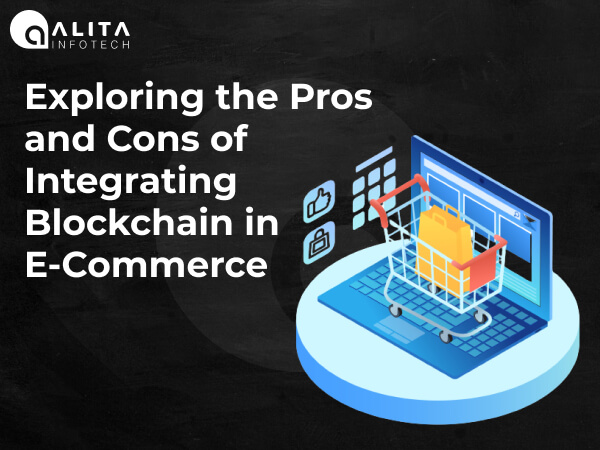In the dynamic landscape of technology today, businesses across B2B and B2C sectors actively seek innovative solutions for streamlining their operations. One technology that’s garnered considerable attention and adoption is blockchain within e-commerce. Its role in ensuring secure data transactions within e-commerce environments has become crucial, offering robust measures to safeguard sensitive information through tamper-proof mechanisms. Moreover, it offers businesses a dependable means to securely protect and exchange data.
Let’s delve into how blockchain is poised to revolutionize e-commerce, highlighting its benefits and limitations. We’ll examine tangible instances of companies incorporating blockchain into their day-to-day operations. Furthermore, we’ll explore the myriad potential applications of blockchain within e-commerce scenarios.
The integration of blockchain empowers e-commerce enterprises to elevate their security, foster transparency, and optimize efficiency. However, it’s imperative to acknowledge the challenges inherent in its implementation. These hurdles encompass technical intricacies, scalability concerns, and the need to navigate regulatory frameworks. To navigate these complexities effectively, we’ll outline best practices for integrating blockchain into e-commerce strategies.
Which Companies Use Blockchain in E-commerce?
In the pursuit of operational optimization, businesses turn to technological advancements, a path many e-commerce companies have chosen. Several have already integrated blockchain technology into their operations:
Walmart:
Despite being a traditional retailer, Walmart holds a significant online presence and has embraced blockchain to track its supply chain. Through collaborations like IBM’s Food Trust Network, they’ve enhanced the safety and traceability of various products, particularly produce.
Starbucks:
Starbucks is experimenting with a blockchain-based system to track the journey of its coffee beans, aiming to boost transparency and uphold ethical sourcing practices. This initiative also offers consumers a clearer understanding of their coffee’s origins.
Amazon Web Services:
AWS’s blockchain templates facilitate the establishment of blockchain networks for e-commerce entities, encouraging innovation and industry growth. These templates empower businesses to leverage blockchain’s advantages and explore novel avenues for their operations.
Use cases of Blockchain in E-commerce
E-commerce is witnessing a remarkable integration of blockchain trends, showcasing its myriad benefits through various use cases. Dive into the immense potential of this technology as we delve into its applications within the e-commerce landscape.
Payment Processing:
Revolutionizing payment processing, blockchain technology offers a secure, transparent, and efficient system for monetary transactions. Its distributed ledger system, ensuring all transactions are securely recorded in a tamper-proof public ledger, underpins its appeal for enhanced security, traceability, and cost-effective, rapid transactions. This technology is increasingly embraced in payment processing for its advantages in security, transparency, cost efficiency, and speed.
Peer-to-Peer Transactions:
Utilizing blockchain and smart contracts, peer-to-peer transactions become feasible without intermediaries. This capability allows companies to create decentralized marketplaces, facilitating direct interactions between buyers and sellers. Such an approach streamlines the exchange of goods and services, reducing financial overheads and enhancing efficiency.
Moreover, this technology holds the potential to create a more inclusive e-commerce ecosystem, offering opportunities to those unable to afford conventional blockchain and e-commerce platform fees.
Offerings of Customized Products:
Blockchain facilitates tailored product offerings by leveraging verified customer data, ensuring its reliability and accuracy. This technology empowers the creation of highly personalized and enticing products. It not only streamlines custom product traceability, adding transparency, but also cultivates greater customer trust in the process.
Availability of Reliable Product Information:
Ensuring the availability of trustworthy product information is crucial in e-commerce. Blockchain technology guarantees secure and immutable product data, benefiting both e-commerce entities and blockchain-based businesses. Customers can access comprehensive details about a product’s origin, manufacturing, and supply chain journey, aligning with their increasing demand for transparency and authenticity in purchases.
Furthermore, organizations such as GS1 set standards for product identification and transactions, augmenting data reliability and fostering interoperability within the e-commerce landscape.
Understanding the Pros of Blockchain in E-commerce
Blockchain technology is a powerful asset in the realm of e-commerce, reshaping transactional processes and data management with a host of benefits.
Efficient Supply Chain Management:
Blockchain’s decentralized ledger ensures the security and transparency of the entire product journey, spanning from manufacturing to the end consumer. This empowers e-commerce businesses to guarantee the authenticity, traceability, and transparency of their supply chains, fostering customer trust and operational efficiency.
For instance, De Beers has integrated blockchain to trace the origins and authenticity of diamonds, allowing consumers to ensure they’re conflict-free.
Enhanced Transparency and Authenticity:
By assigning unique identifiers like QR codes to products and creating immutable transaction records, blockchain enables seamless traceability across the supply chain. This verification process confirms product origin and authenticity, establishing trust among consumers who can verify product quality and origins.
Combating Fraudulent Activities:
Fraudulent activities, from payment fraud to fake reviews, pose risks to e-commerce businesses’ finances and reputation. Blockchain’s decentralized nature makes data manipulation challenging for hackers. Its transparency helps identify anomalies, while linking product reviews to verified purchases and recording them immutably prevents fraudulent reviews.
Moreover, blockchain securely stores and verifies customer data, reducing unauthorized access risks and bolstering security through cryptographic signatures, safeguarding sensitive customer information.
Facilitating Data Traceability:
In e-commerce, data traceability is pivotal for transparency, quality control, and compliance with regulations, allowing seamless tracking throughout the supply chain.
